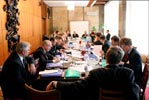

In early March 2006, the International Criminal Law Society logistically supported by Moldovan Section of the International Society for Human Rights organized the two-day seminar "The Republic of Moldova and the International Criminal Court" in Chisinau, Republic of Moldova. During the two day seminar 35 Moldovan and international legal experts discussed ways how the Republic of Moldova could ratify the ICC Statute and implement the obligations contained therein.
Adrian JACOBOVITS DE SZEGED, the EU Special Representative to the Republic of Moldova, stated at the beginning of the seminar that the EU Action Plan for Moldova mentions the ratification of the ICC Statute by the Republic of Moldova as a 'priority'.
In response to such expectations of the European Union Nicolae ESANU, Deputy Minister of Justice of the Republic of Moldova, expressed his intentions to propose legislation to the government to amend the Moldovan Constitution and to implement the substantive and procedural notions contained in the ICC Statute into domestic law. Ms. FILATOVA, Director of the Division of elaboration of normative acts (General Directorate of Legislation in the Ministry of Justice of Moldova) indicated that such an amendment process may take up to one year. Victor PUSCAS, the President of the Constitutional Court of the Republic of Moldova presented his reflections on Moldova's legal settings for ratification as expressed in the a dvisory opinion of the Constitutional Court. International experts from the Dutch and German Ministries of Justice, of the German Foreign Office and the International Criminal Court delivered keynote speeches on the principle of universality, complementarity, their experience with domestic implementation of substantive law of the ICC Statute, domestic laws on cooperation with the ICC.
For further information see the Final Report.

Students at the entrance of the International Criminal Court in The Hague
The seminar showed that with the entry in to force of the Statute of the Criminal Court (ICC), the international community established an instrument to punish grave violations of humanitarian law. Through the ICC international standards of human rights are implemented.
Assisted by original documents, the students studied the development of international criminal justice since the International Military Tribunal in Nuremberg. Concrete case law of international tribunals was discussed. Further discussed topics were the information on and prevention of violations of human rights as well as rehabilitation and restitution of victims.
At the end of the seminar, in March 2006, a four-day excursion to International Tribunals in The Hague was organised. The ICTY, ICC and also ICJ (International Court of Justice) were visited and subjects discussed with practitioners. As the ex-President of Yugoslavia, Mr. Slobodan Milosevic, died the weekend prior to the excursion, the students could assist the historical closing of the proceedings against Milosevic.